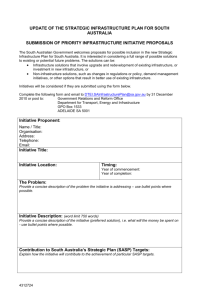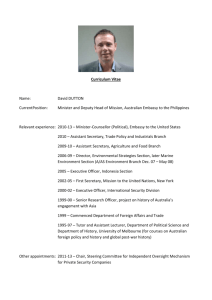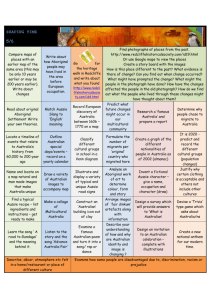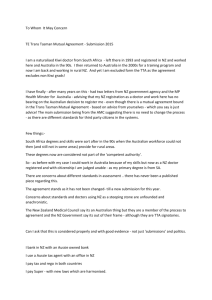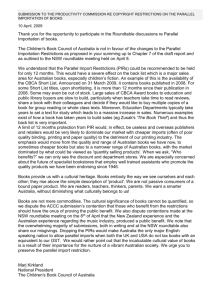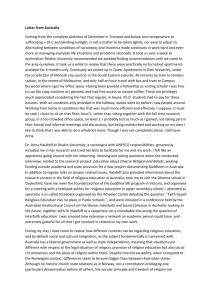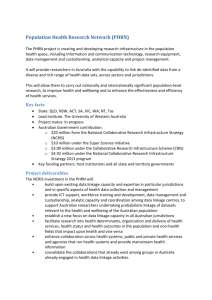Beyond Borders Presentation
advertisement
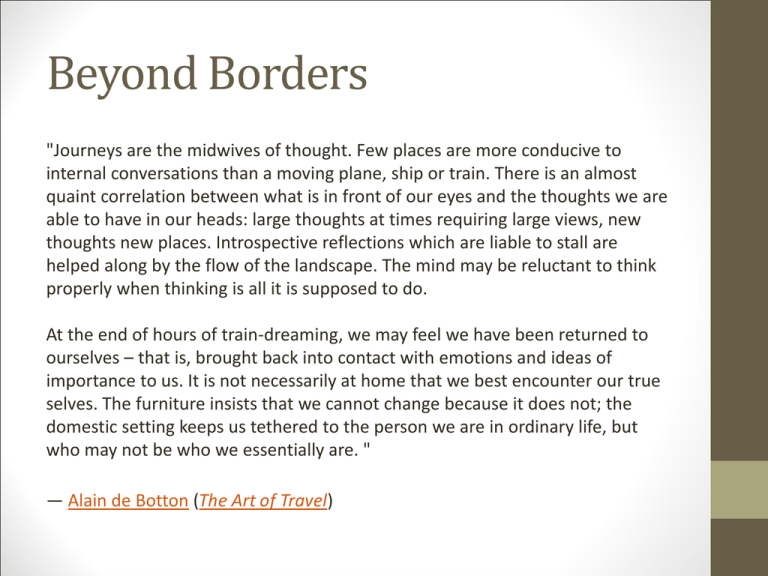
Beyond Borders "Journeys are the midwives of thought. Few places are more conducive to internal conversations than a moving plane, ship or train. There is an almost quaint correlation between what is in front of our eyes and the thoughts we are able to have in our heads: large thoughts at times requiring large views, new thoughts new places. Introspective reflections which are liable to stall are helped along by the flow of the landscape. The mind may be reluctant to think properly when thinking is all it is supposed to do. At the end of hours of train-dreaming, we may feel we have been returned to ourselves – that is, brought back into contact with emotions and ideas of importance to us. It is not necessarily at home that we best encounter our true selves. The furniture insists that we cannot change because it does not; the domestic setting keeps us tethered to the person we are in ordinary life, but who may not be who we essentially are. " — Alain de Botton (The Art of Travel) Beyond Borders: Exploring the Self through Diverse Perspectives A Year 9 English Unit by Hugo Grieve – Loreto Kirribilli Maura Manning – Pymble Ladies’ College The Situation • “A recent National Geographic study tested 18-24 year old Americans, 83 percent of whom could not find Afghanistan on a map. Seventy percent could not find Israel or Iran. Only 37 percent could locate Iraq.” • “50 percent of all the books in translation now published worldwide are translated from English, but only 6 percent are translated into English.” • “We have never been less isolationist in the variety of goods and services we consume from around the world, and never have we been more ignorant of the people who produce them.” Exploration of Difference • It is not about what “makes us all the same” • Opportunity to value dissonance • Authentic learning begins when a student has powerful sense that they have encountered something fundamentally unfamiliar. Our Intent • To explore the complexities that inform contemporary Australian adolescent identity which is no longer bound by traditional national borders. • To encourage Year 9 students to look beyond themselves. • To develop a critical awareness of others’ perspectives to enrich their understanding of themselves and our world. • To address the Asian literature and general capabilities/crosscurricular requirements of the Australian Curriculum. • To foster critical thinking and independence. Australian Curriculum • To "equip all young Australians with the essential skills, knowledge and capabilities to thrive and compete in a globalised world and information rich workplaces of the current century." Cross Curriculum Areas of the Australian Curriculum • Asia and Australia’s relationship • Information and with Asia [A] communication technologies [ICT] • Civics and citizenship [CC] • Intercultural understanding [IU] • Critical and creative thinking [CCT] • Difference and diversity [DD] • Ethical understanding [EU] • Literacy [L] • Personal and social competence [PSC] The Unit • Meaningful exploration of global awareness – not just ticking a box that we have “done Asia” • Using texts from Asia, Australia, US as a lens to examine ourselves • Expanding our definition of Asia to include the rich literary heritage of South East Asia and the sub-continent • The exploration of the notion of dual identity • Providing students with opportunities to work independently and collaboratively at their own pace to cover a diverse range of texts and ideas Flexible Grouping • Many options for grouping • • • • Ability Learning Style Particular Skills Interest • Differentiation • Maker Model (1982) • • • • Content Process Product Learning Environment Essential Questions • How does Asia influence our Australian identity? • Why should I want to know more about literature in Asia? • Why adopt a global perspective? Design • Students are issued a “passport” • Over the course of the unit, students travel from country to country building their knowledge of the place/culture and reflecting on how the texts inform their understanding of identity • Classes blocked on together move flexibly from room to room completing tasks and reflecting on their experiences allow students to work at their own pace. Sequence of Activities • Building understanding of what informs identity • Discussion of concept of dual or multiple identities • Journey begins • Text exploring being Asian in Australia (e.g. story from Growing Up Asian in Australia) • Analytical writing activities • Text exploring conflict of identity in the culture (substantial text) • Range of activities based on this text • Popular culture text • Non-fiction exploring youth culture/culture of country • Student reflection in their “passport” • Student contribution to class Facebook • Once students have completed tasks for this place, they travel to the next country and undertake similar sequence there. Project Zero Visible Thinking • Purpose and Goals Visible Thinking is a flexible and systematic research-based approach to integrating the development of students' thinking with content learning across subject matters. An extensive and adaptable collection of practices, Visible Thinking has a double goal: on the one hand, to cultivate students' thinking skills and dispositions, and, on the other, to deepen content learning. By thinking dispositions, we mean curiosity, concern for truth and understanding, a creative mindset, not just being skilled but also alert to thinking and learning opportunities and eager to take them 8 Cultural Forces that Define our Classrooms • Time • Modelling • Opportunities • Interactions & Relationships • Routines & Structures • Physical Environment • Language • Expectations Strengths • Positive staff feedback as they are working in their areas of interest. • Students enjoyed the variety of teaching styles • Element of surprise • Classrooms became cultural landscapes Challenges • Reporting/tracking students’ progress • Teacher understanding • Uneven resources for different countries • Parental concern about student placement • Tension in teaching styles



